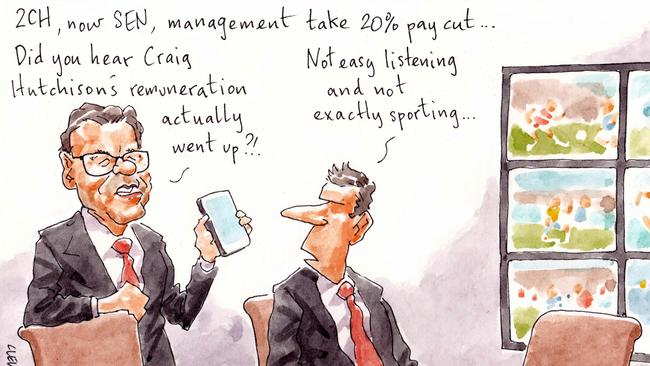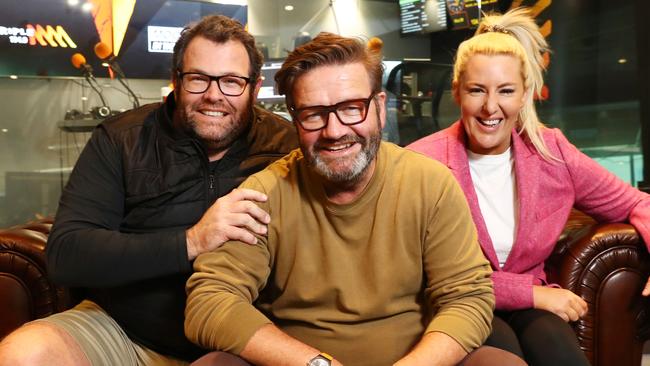Craig Hutchison cashes in despite virus fallout

Craig Hutchison, the man behind Pacific Star Network’s pivot from easy listening radio to 24/7 sports at Sydney’s Sports Entertainment Network, has taken a plump pay cheque amid the pandemic, even as the company takes a hit.
All key management personnel and board members, including chief Hutchinson, chairman and Viburnum co-founder Craig Coleman and director Ronald Hall, each took a 20 per cent cut to fees or salaries in light of the company’s plunging revenues, as the shutdown of sports due to COVID-19 crimped advertising revenue.
Despite that, the sports journalist turned media entrepreneur still came out better off than last year, netting a total salary package of $624,246 plus a further $400,000 paid out to his personal entity Craig Hutchison Media for “talent and consulting services”.
That’s while the group put its hand out for $1.62m in JobKeeper payments from the government.
Pacific Star’s new 1170 SEN Sydney station, a rebrand from 2CH, which it acquired for $11.2m in June, is shaping up to launch ahead of NRL finals season and the key State of Origin competition — and has lured high-profile sporting names including Fox League’s Andrew Voss, Ten’s former head of sport, Matt White and the Footy Show’s Matty Johns.
Triple M’s struggles
Things aren’t looking so upbeat at Matty Johns’ former home, Triple M, owned by fellow listed radio network Southern Cross Media, whose shares are yet to recover from the mid-pandemic rout.
Chief and managing director Grant Blackley is shaping up to have his 10 per cent coronavirus pay cut unwound later this week, but at just over $1.2m that won’t put him much ahead of star breakfast show hosts such as Lawrence ‘Moonman’ Mooney in Sydney or Fifi, Fev and Byron on Fox FM in Melbourne.

Then again, a jingle like “You’ve got the Blackley in the morning”, just doesn’t have the same ring.
In its annual report, the Southern Cross board conceded that the 77 per cent year-to-date dive in its shares had taken a toll on the holdings off its board — taking ownership well below the minimum required in its senior executive ownership policy.
Blackley, also chair of Commercial Radio Australia alongside incoming oOh!media chief Cathy O’Connor, is required to hold at least 100 per cent of his fixed salary in shares, but with recent trade around only 15c not even a vesting of performance rights, short-term incentives or even participation in the group’s mid-pandemic capital raise have got him over the line — with just $294,948 in holdings by year’s end.
People and culture committee chair Helen Nash acknowledged the “significant fall” in the group’s shares, saying all board members would have three years to re-establish their required minimum holdings.
Still, that may not be too difficult given that the short-term incentive scorecard for execs in the current year makes no mention of earnings or total shareholder returns, only “revenue to ratings power ratios” and implementation of a lean operating model. Long-term targets, meanwhile, are still non-existent.
Save a thought, though, for retiring chairman Peter Bush, who has been replaced by Metcash chair Rob Murray, and deputy chair Leon Pasternak — both of whom leave at the upcoming AGM with significant holdings in the now heavily discounted shares.
A former Merrill Lynch managing director, Pasternak is the longest-serving director, largest individual shareholder and has watched the company’s share price slowly disintegrate from $2.50 when he joined in September 2005.
Still, whether out of confidence in the group or just blind allegiance, he has never once sold any of his shares. That leaves him with a 0.12 per cent stake in the group when he retires — worth less than half a million dollars while Bush leaves with shares worth just over $53,600.
Crown hit jobs
One of the colourful highlights of Patricia Bergin’s inquisition of Crown’s executives and directors in recent months has been the propensity for the odd one or two to dump on others. After all, this was a place where many big names competed for the attention of their globetrotting boss, James Packer.
When Crown’s former CEO Rowen Craigie was in the box a while ago, he had a gentle dig at Heatherton’s Capital Golf Club manager, Ishan Ratnam — better known as Packer’s special assistant — whose big day in the witness box was, let’s say, cringe-worthy viewing.
Asked by Counsel Assisting Adam Bell if he had seen Ratnam’s testimony, a grinning Craigie replied: “No I didn’t. That highlight will come later tonight no doubt.”
On Monday it was the turn of one of Packer’s right-hand men, Michael Johnston, to have a not so subtle dig at Crown’s former executive chairman and former Fairfax newspaper editor, John Alexander.
Johnston revealed he first spoke to Alexander about Packer’s plan to sell a bunch of his Crown shares to Lawrence Ho’s Melco Group after 11pm the night the deal was announced on May 30 last year.
Alexander had just got off a plane in Los Angeles — presumably from his first-class seat to go and see Packer — and Johnston told the inquiry that JA was not so enamoured with the news.
A few months earlier a planned $10bn takeover of Crown by US casino behemoth Wynn Resorts had been scuttled after the terms of the deal were leaked.
“His voice was very flat, which is understandable because if we had something like the Wynn transaction, he would have benefited quite handsomely under his executive remuneration plans, given he had [share] options,” Johnston said. Whack. Johnston relayed JA’s displeasure in a text later that night to Guy Jalland, the boss of Packer’s private company and, like Johnston, a Crown director.
“JA didn’t sound surprised but didn’t sound happy,” the text read.
Not that Alexander, who will appear before the inquiry this week, should have been too worried.
After years of taking home big pay packets, when he stepped down as executive chairman in January to become an executive director — which we understand was a pretty fancy title for a role that just involved calling in to the board meetings and not much else — he kept his $3.5m annual salary.
And when his fellow Crown execs took a 20 per cent pay cut when COVID-19 hit, JA’s pay remained untouched, which we reckon proved it was more of a golden goodbye from his billionaire boss.
Property price tonic
Some Melburnians are proving it is possible to have quite a good crisis. While much of the state bunkers down, the more savvy have spent time improving their property portfolios. In a jolt to the Mornington peninsula market sure to be felt all the way to Toorak, My Chemist Retail Group co-owner Mario Verrocchi appears to have smashed records when securing Mount Eliza’s Morning Star estate for close to its $40m asking price, just months after it went on the block.
The chief executive of My Chemist Retail Group, comprising the Chemist Warehouse and My Chemist chains, quietly lodged a caveat on the property in September and it has now been reported as sold. While somewhat affected by lockdowns, Jack Gance and Verrocchi’s pharmacy empire has emerged as a big winner as health concerns have soared and customers are chasing medicines, vitamins, hand sanitiser and cleaning products. The business generates more than $4bn annually, prompting talk of a $10bn float, which was originally set for this year.
The identity of the purchaser of the property likened to a local version of Downton Abbey has been closely guarded after a sales campaign handled by Michael Keating of eponymous agency Michael Keating International. The property was sold by Judy Barrett, who had run it as a hospitality and events venture.
The estate sports a 1860s mansion and was the scene of the movie Kath & Kimderella, a spin-off of TV series Kath & Kim, created by Gina Riley and Jane Turner. For Verrocchi, the vast seaside estate seems more like a place to brood over the next corporate play. Helpfully, it comes with its own kind of medicine, a 12ha vineyard, stocked with French grapes, brought over by the Franciscan friars who ran it in the 1930s.



To join the conversation, please log in. Don't have an account? Register
Join the conversation, you are commenting as Logout